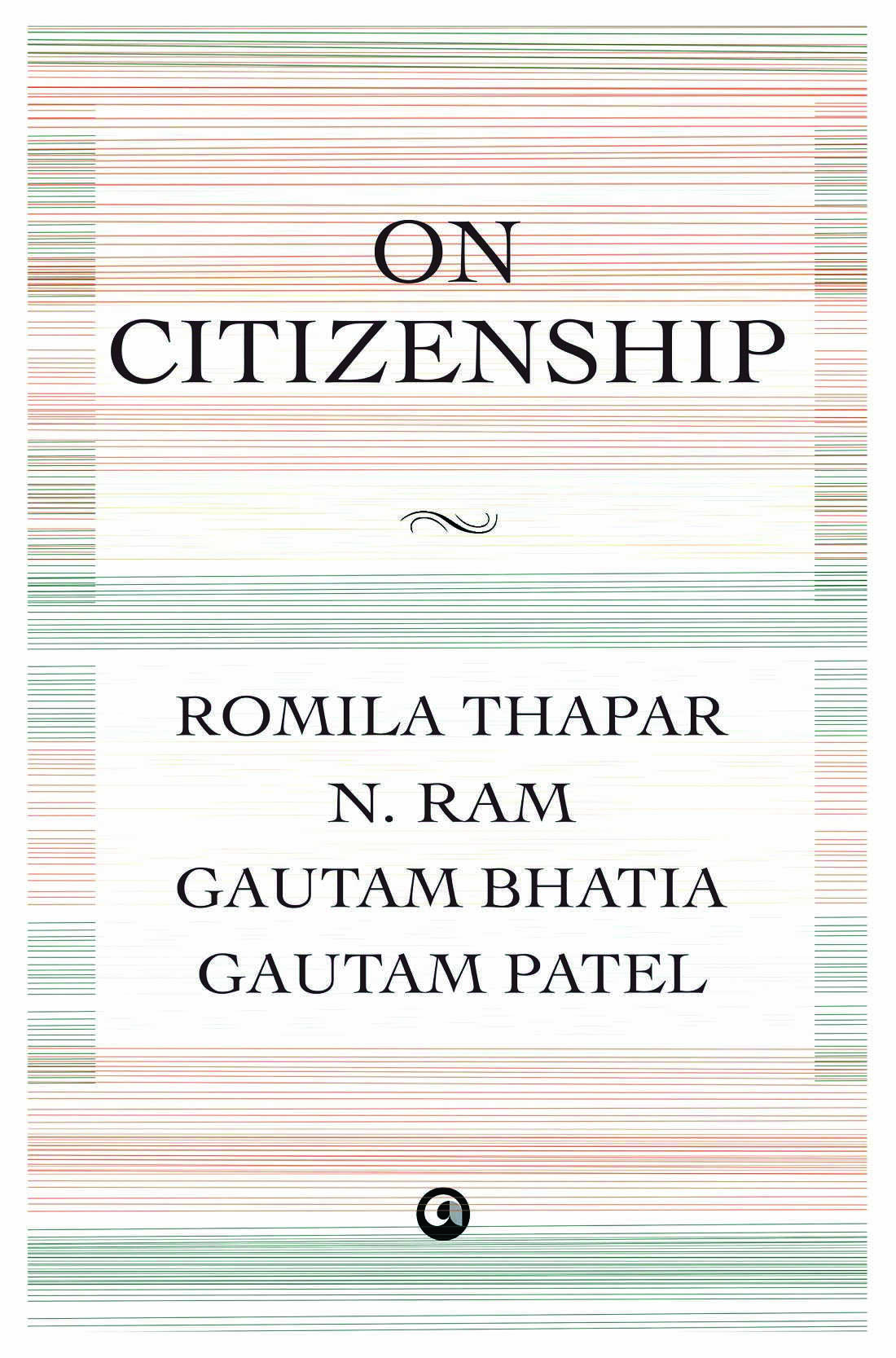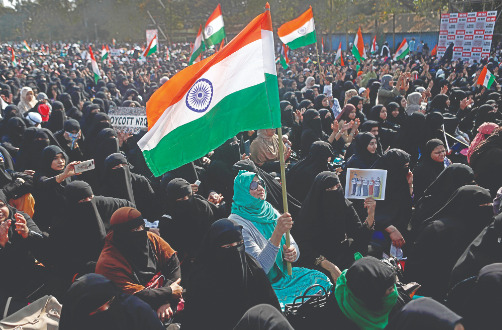"ON CITIZENSHIP" | Politics of citizenship
In ‘On Citizenship’, N Ram along with Romila Thapar and a few others, explore the politics of citizenship over seven decades in the sovereign, secular, democratic republic of India that must necessarily start with the question: ‘what do we mean by the politics of citizenship’; Excerpts:
Author: N Ram, Romila Thapar, Gautam Bhatia and Gautam Patel
Publisher: Aleph Book Company
India might have awakened to ‘life and freedom’ at the stroke of the midnight hour separating 14 August and 15 August 1947. However, as the political scientist Niraja Gopal Jayal notes in an incisive critical study of Indian citizenship and its discontents, ‘365 million subjects of King George VI were not magically turned into citizens as that midnight hour struck’—and thereby hangs a complicated and chequered tale.
The story has several dimensions: historical, constitutional, legal, philosophical, socio-cultural, and political. They intersect, of course. My remit in the division of labour in this book, assigned according to competence, is to deal with the evolving politics of citizenship in the sovereign, secular, democratic republic of India. The ‘transformative’, living Constitution and our democratic assets—parliament and state legislatures, the executive at the centre and in the states, the judiciary, other institutions that function under constitutional or statutory authority, the news media, civil society organizations, and, in the final analysis, ‘we, the people of India’, individually and collectively—have a vital role to play in this. The Constitution has been designed, and the democratic institutions all formally pledged, to promote fealty, not to any strongman or to any kind of majoritarianism, but to the core values of the Indian republic as set out in the Preamble: justice, liberty, equality, and fraternity. How seriously the law and the courts of law take these values matters a good deal, but how society and the political system respond to them matters even more.

In his last speech to the Constituent Assembly, made on 25 November 1949, B. R. Ambedkar, chairman of the Drafting Committee, brought out clearly and powerfully the importance of understanding the interdependence of the principles of liberty, equality, and fraternity, and getting what he termed the ‘union of trinity’ right. He warned against internal threats to democracy and society such as ‘Bhakti or hero-worship…in politics’ to which Indians were particularly addicted. ‘It is quite possible’, he mused, ‘for this new-born democracy to retain its form but give place to dictatorship in fact. If there is a landslide [he was no doubt referring to an electoral landslide], the danger of the second possibility becoming actuality is much greater.’ In support of his argument, he recalled John Stuart Mill’s famous caution to people interested in the maintenance of democracy not to ‘lay their liberties at the feet of even a great man, or to trust him with powers which enable him to subvert their institutions’.
Equally important was Ambedkar’s warning in this speech against letting ‘the complete absence of two things in Indian society’, equality, social and economic, and fraternity, continue unchecked. If the contradiction between recognizing ‘the principle of one man, one vote and one vote, one value’ in politics and denying ‘the principle of one man, one value’, or equality in social and economic life was not resolved, political democracy could not be expected to survive. ‘How long shall we continue to live this life of contradictions?’, he demanded. ‘How long shall we continue to deny equality in our social and economic life? If we continue to deny it for long, we will do so only by putting our political democracy in peril. We must remove this contradiction at the earliest possible moment or else those who suffer from inequality will blow up the structure of political democracy which this Assembly has so laboriously built up.’
The mixed tone of this speech—sombre reflections and dire warnings combining with the positive, socially radical ideas that formed the bedrock of Ambedkar’s thinking on democracy and, specifically, rights-bearing citizenship—was surely unexpected. As he himself noted, it might not have been ‘very pleasant’ for some members of the Constituent Assembly to hear. But political events, trends, and developments over the next seven decades would demonstrate that Ambedkar got it exactly right, so much so that these reflections, warnings, and progressive ideas are of great relevance to the practice of democracy and the politics of citizenship today.
But before getting into this subject substantively, let me enter a personal note.
Two of the contributors to this book, including me, were among those 365 million who did not magically become citizens when India awoke to life and freedom. Although I did not, naturally, realize it at that time nor reflect on it until I was well into writing this essay, I was born a subject, not a citizen. It took me two years after that to reach the twilight zone in which I was properly neither subject nor citizen and this was followed by an eventful and mostly dark predawn interregnum which lasted more than two years, before I could claim real, bona fide citizenship in the ‘sovereign democratic republic’ constituted by ‘we, the people of India’. Or could I? After all, I was born in Madras that is now Chennai, went to school and college here, voted here, married here, and have, in fact, lived here for all but three years of my student and working life. But can I establish this? I suppose I can.
Taken individually, my Indian passport or my Electors Photo Identity Card (EPIC) or my Aadhaar card, or my ‘Birth Certificate’ (archived and downloadable from the Greater Chennai Corporation’s digital repository, bearing the names of my parents and the correct date of my birth in Republican India as I know it, but not my given name, which was quite common in the old days), may not satisfy an adamantine bureaucratic mind swathed in red tape. Nor will, I know, my academic degrees or reported cricket scores from my school and college days. But I seem to have sufficient combined documentation to prove my legal citizenship status, more or less, probably beyond ‘reasonable doubt’ and at a minimum on the basis of what is known in jurisprudence as ‘a preponderance of probabilities’. But how many of us, among India’s current population of 1.38 billion (as of 2020), have the documentation, the resources, and the stamina to prove our citizenship or right to citizenship by birth or descent or whatever to official, bureaucratic satisfaction in an arbitrary, undemocratic, biased, and surveillance-oriented citizenship regime?
The political construction of citizenship
Exploring the politics of citizenship over seven decades in the sovereign, secular, democratic republic of India must necessarily start with the question: what do we mean by the politics of citizenship? A citizen is generally defined in the theoretical literature as ‘a member of a political community who enjoys the rights and assumes the duties of membership’. The dimensions of this membership are broadly classified as citizenship as legal status, defined by civil, political, and social rights, citizenship as political agency, and citizenship as a source of identity and belonging. These formulations are deceptively neat and simple, hiding a number of contradictions, tensions, ambivalences, fault lines, and, arguably, paradigm shifts in a globalized world. But they will serve as a basis for a working definition. Since governance by the state and the relationship between the state and individuals, groups, communities, and classes are intrinsically contentious, the politics of citizenship can be conceptualized as ‘contentious interactions over the institutionalisation and realisation of substantive membership, legal status, rights, and participation’. This definition certainly fits the complicated and chequered story of citizenship in India over seven decades.
This political history divides naturally into four chapters. The first begins with the making and provisioning of citizenship in Part II of the Constitution at its commencement and takes us to the enactment of the Citizenship Act, 1955. The second chapter turns out to be a relatively quiet period, 1955 to 1985. Chapter three covers the period from 1986, when the citizenship law is amended to make special provision for Assam in line with the 1985 Assam Accord, to 2003–04, when perhaps the most significant and far-going changes are made to the legal–political regime governing citizenship. The fourth and yet to be concluded chapter encompasses what has been happening since 3 December 2004, when the Citizenship (Amendment) Act, 2003, and with it a new citizenship regime for which the foundations were laid in chapter three came into force.
CAA-NPR-NRC
Let me start with the last chapter and set out my position on the controversy over the Citizenship (Amendment) Act, 2019, or CAA that was raging for months in the Indian public arena before the global crisis of the COVID-19 pandemic pushed it off newspaper front pages and prime time television news, to the very margins of politics. But the controversy, which has been in the making for decades and reached a boiling point in late-2019, will not go away. At its heart is the
question whether Hindu communal majoritarianism, the concept of Hindutva put into practice, can be allowed to trump the ‘secular character of the Constitution’ that forms part of its basic structure. A contentious issue that cropped up, in the wake of Partition, in the Constituent Assembly Debates, an issue that Jawaharlal Nehru called ‘a little thing…dust in the pan’, became a very big deal in 2019–20.
Viewed in combination with two other citizenship related projects—an amplified National Population Register (NPR) exercise and the threatened countrywide National Register of Citizens (NRC)—the CAA posed a direct challenge to India’s democratic and secular polity and to its political stability. No timeline has been set yet for the implementation of the
all-India NRC, which has been conceived and designed in law as a purely administrative project feeding off the population register. On the other hand, the fieldwork of updating the NPR (except for Assam), alongside Phase I of the Census, 2021, was notified for implementation in all states and union territories between April and September 2020 but has, unavoidably, been ‘postponed until further orders’.
The big deal, it became clear, had four separate, but interrelated political components: the provocative and polarizing enactment of the CAA; the mass upsurge against it, seen in tandem with the NRC and the NPR, across much of the country; the repression and violence unleashed on the protesters by both the state and gangs of bigoted thugs; and a potential crisis of federalism, manifested by tensions and a possible showdown between several states and the central dispensation on the citizenship question.
Excerpted with permission from On Citizenship, published by Aleph Book Company



